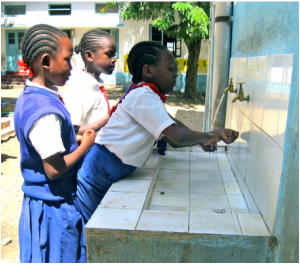Engaging faiths in Uganda on menstrual health
|
Imagine having to manage your period when you don't have access to sanitary protection (or even pants)? And your school's toilets are overcrowded and dirty with doors that don't close properly and no water for washing hands? That's the reality for many girls - and it's a big reason why so many drop out of school.
|
I used to think this issue was not very |
Managing menstruation
|
Time spent collecting water is not the only problem affecting girls. When girls begin menstruating, their problems increase.
Imagine having to manage your period when you don't have access to sanitary protection (or even pants, in some cases) and your school's toilets are overcrowded, dirty and don't have doors that close properly or water for washing hands. No wonder many girls choose to stay at home when their period arrives – with damaging consequences for their |
education and their future life chances.
Studies show that only 89 girls for 100 boys finish primary school, and even fewer complete secondary school. Access to safe, clean toilets and washrooms is critical to enabling girls to stay in school. Research carried out in 140 primary schools in Uganda, for example, found that 60% of girls aged 11-13 stayed away from school because of periods. This amounted to at least 11% learning time lost because of menstrual periods. |
Girl-friendly facilitiesSo how can schools provide facilities to make it easier for girls to stay in education?
Girls need separate toilets from boys. Those toilets need to provide them with privacy, safety and dignity. They need washing facilities at the latrines, and a bin to dispose of sanitary products. Girls also need a supportive environment and a friendly teacher or adult they can go to with menstruation issues. |
Addressing fears and taboosWomen spend about 3,000 days in their life menstruating. Menstruation is a natural biological process that is an essential part of growing up and becoming an adult.
There is, however, often a great deal of ignorance about the simple facts of puberty. This can be compounded by traditional cultural norms or even religious taboos which sometimes reinforce beliefs that menstruation is dirty. |
Menstrual health toolkitsFaith in Water is developing menstrual health toolkits for girls, beginning in East Africa. The toolkits will teach girls about this natural biological process as well as how to manage their own periods with dignity and safety.
They will help schools understand what is needed to create girl-friendly toilets. And they will begin a conversation in the wider faith community to dispel some of the myths and taboos around periods. |
Picture credits: Clockwise from top: Collecting water by Andrew Ashton, Star of the Sea school, by Kenya Organisation for Environmental Education

